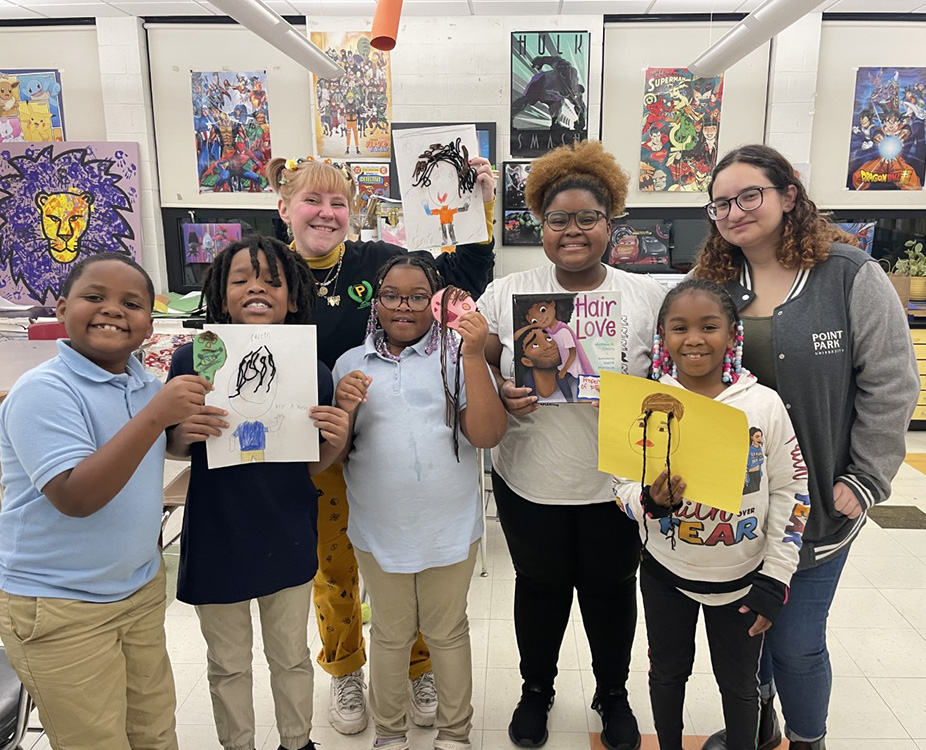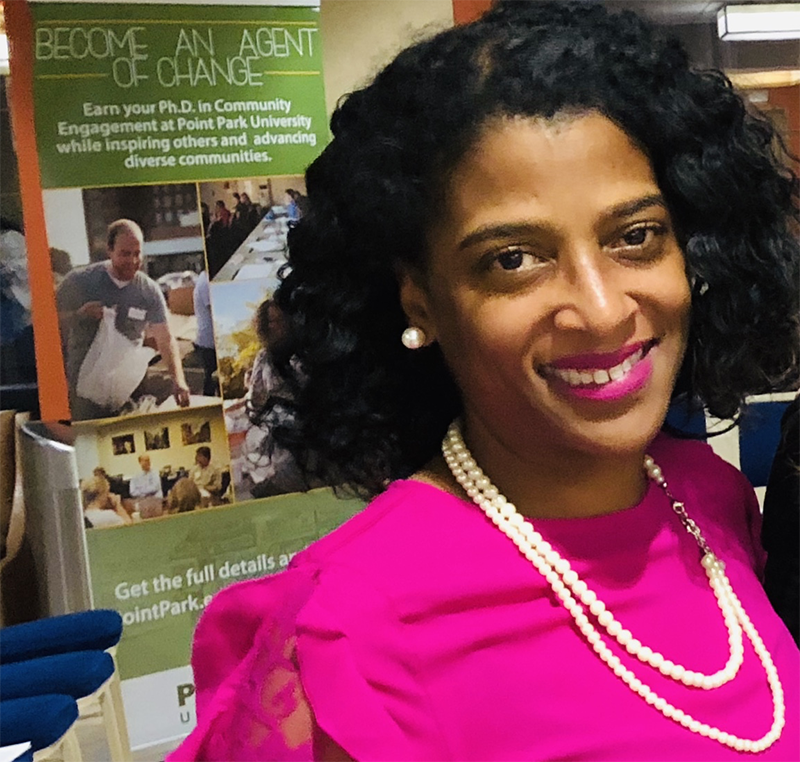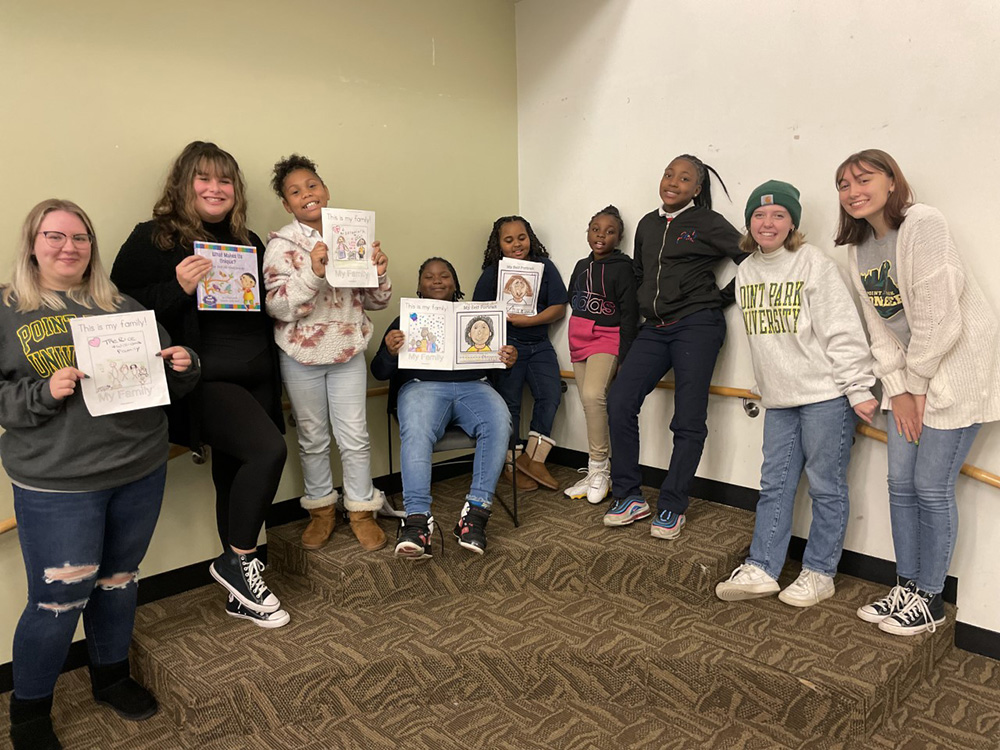School of Education Students Gain Impactful Field Experience Through Family and Community Diversity Course Tuesday, January 24, 2023

Point Park University students pose for a photo with Pittsburgh Faison students after facilitating a mini-lesson based on the book "Hair Love," by Matthew A. Cherry. The field experience was part of Point Park's Family and Community Diversity course. Tayler Cleveland '25, pictured third from the right, said she sought to empower the students and teach them to respect their differences, while also acknowledging that they are all beautiful. Submitted photo.
“I think having experiences like this so early in my career is so rewarding because it allows me to become more comfortable in the setting I plan to work in for the rest of my life. It also allows me to create meaningful and impactful experiences for young minds, which I really appreciate.”
One of the most impactful lessons secondary education major Tayler Cleveland ’25 has learned this academic year is what it means to be an equitable teacher.
“I really want to emphasize the importance of that in any environment I work in,” she said. “I also learned the value of teaching culturally relevant lessons and how offering different perspectives does so much more good than one would expect. I want my future students to leave my classroom knowing that their voice matters, and they deserve to take up space in this world.”
These powerful takeaways illustrate the value that Cleveland and other students found in Dr. Rhonda Threet’s Family and Community Diversity course last semester. The course, a requirement for education majors and an option for other majors, focuses on methods and strategies for creating a positive, inclusive learning environment that addresses the various cognitive, affective and developmental needs of diverse learners. To further their learning outside of the classroom, Threet arranged for students to have a hands-on field experience at Pittsburgh Faison’s K-5 after-school program, during which they worked in groups of four to facilitate mini-lessons based on positive, identity-affirming children’s books with 40 elementary school students.
“I think having experiences like this so early in my career is so rewarding because it allows me to become more comfortable in the setting I plan to work in for the rest of my life,” said Cleveland, an alumna of McKeesport Area Senior High School. “It also allows me to create meaningful and impactful experiences for young minds, which I really appreciate.”
'Courageous Conversations'
This was Threet's first time teaching the Family and Community Diversity course. She said Stanley Denton, Ph.D., professor of education, passed her the baton and encouraged her to develop her own approach for the coursework. The course has been a bit of a full-circle moment for Threet. A Pittsburgh Public Schools educator and senior policy fellow with Teach Plus Pennsylvania, she is an alumna of Point Park’s community engagement doctoral program, for which her dissertation examined how culturally relevant pedagogy impacts positive racial identity for African American students.

Rhonda Threet, Ph.D.
“I am always marveling about the community engagement program because it is so interdisciplinary, and I was able to bring my passion into it,” she said. “I realized the importance of all these different sectors to make positive change. It gave me the tools and leverage to want to look at policies and the way we’re preparing our future teachers.”
For Family and Community Diversity, Threet focused on giving her students the tools they need to start the journey of becoming more racially and critically conscious of systems and practices that impact children, families and communities and to be mindful of what it really looks like to work with diverse families or families that are different than their own. She connected their discussions to the recently released Culturally-Relevant and Sustaining Education Program Framework Guidelines from the Pennsylvania Department of Education and pushed them to think about those new competencies as they created their lesson plans.
The main textbook for the class is "Courageous Conversations About Race" by author Glenn E. Singleton, which provides a framework for engaging in productive discussions about race. Threet has used it in her work with teachers at Pittsburgh Public Schools. She also incorporated "Building Culturally Responsive Family-School Relationships," by Ellen S. Amatea into the curriculum.
"For 16 years, I've engaged in this type of work, and I’ve seen the benefit and impact it’s had on my life and other teachers from all creeds and backgrounds," she said. "I’m extremely passionate about how we’re preparing teachers. To dig deep, to have a true, critical consciousness and develop your own positive racial identity – this work is so important."
A life-changing aspect of the course for elementary education major Gabriella Frisco '26 was how Threet established four agreements with the students: Speak your truth, stay engaged, expect and accept non-disclosure and experience discomfort.
“I am always afraid to ruffle feathers, and I am always afraid to offend someone or misspeak," said Frisco, an alumna of Wilmington Area High School. "For me, that is where experiencing discomfort comes in. I experienced discomfort more times than I can count in this class, which I am so grateful for because it helped me grow in my racial journey."
Frisco had a compelling a-ha moment during a class discussion on the representation of different cultures and races.
"As a white woman, I thought we should talk about the hardships, how awful slavery was and the Black Lives Matter (BLM) movement," she said. "But the Black students in the class said to also talk about the good, to talk about Black joy. That changed my perspective on how I want to teach and what I want to highlight in my future classroom."
Experiential Learning
 At Pittsburgh Faison, students took the many concepts Threet taught them and mindfully put them into practice. Their mini-lessons were well received by the young students.
At Pittsburgh Faison, students took the many concepts Threet taught them and mindfully put them into practice. Their mini-lessons were well received by the young students.
Cleveland’s group focused on the book, “Hair Love,” by Matthew A. Cherry, a touching story about a father, his young daughter and embracing one’s natural hair texture.
“I read the book to a group of second and third graders, and then they drew self-portraits and got to make their hair out of yarn,” Cleveland said. “My goal for the lesson was to empower the students and teach them to respect their differences, while also acknowledging that they are all beautiful. It meant a lot to me that I could teach students who look like me a lesson like that.”
“The Sandwich Swap,” by Rania Al Abdullah and Kelly DiPucchio, a story about embracing cultural differences, was the book of choice for elementary and special education major Sarah Rock’s group. After reading to the students, they had students draw and color their favorite sandwiches using sandwich bread printouts.
“For Dr. Threet to have our class go out and obtain hands-on experience was extremely helpful for me personally,” said Rock '25, an alumna of Moon Area High School. “I got to see where the lesson plan had its strengths and weaknesses. We put everything we learned and practiced into motion. It was incredibly rewarding to see our lesson in action, creating the impact we wanted it to create. I got to see the fruits of our labor, and the students were so grateful.”
Rock sees herself using what she learned in the class throughout her career and beyond.
"I learned tools that will help me in my personal life and future classroom, and I learned so much from my peers just talking about the work we were doing and their personal testimonies," Rock said. "That is something I will hold for a lifetime. Dr. Threet was amazing when explaining the course, and each class she asked us genuinely how we were doing. It opened my eyes to another way to create positive relationships with students."
Elementary education major Anani Debose '25 was in Rock's group and wrote their lesson plan. She said the experience broadened her understanding of how a classroom environment functions.
"I am super grateful that I got to see how fulfilling my job will be and how much of a difference I can make in student's life," said Debose, an alumna of Mount Mercy Academy in Buffalo, New York. "I learned that children love to talk. They love sharing every little detail about themselves. One of the key concepts that I took from the class is that everyone and every child is different. Every child has a different background, a different story and goes through their own unique struggles. We as educators need to accept students with open arms and a welcoming attitude. I see myself applying that welcoming mindset in my future career pursuits."
Frisco and her group planned a lesson around a book called “What Makes Us Unique” by Jillian Roberts. It highlights differences in appearances, celebrations and interests in a positive light.
"We had the kids draw pictures of themselves and talk about what made them unique," she said. "When they were done drawing, we had them share their pictures and their thoughts with the class. At the end of the lesson, a little girl hugged me and held on tight, and I am just glad I was there to give her that. I think she needed that."
After their time at Pittsburgh Faison, Frisco said she "knew 100% I am meant to be in the education field."
Read below why these students recommend Point Park’s School of Education:
“I would recommend Point Park's School of Education to a prospective student because I have never met people who care more in my life. The professors here are more than qualified, and they genuinely care about each student they encounter. Being in the School of Education has taught me the most valuable life lessons, and I don't think other universities have a community like this one.” – Tayler Cleveland ’25
"I recommend Point Park's School of Education because the faculty provide you with so much experience and knowledge that will get you prepared for your future. They constantly put you first and will help you succeed to your fullest potential. They help you to understand the value in the work and how impactful it is." – Anani Debose '25
“I would recommend Point Park’s School of Education to a prospective student because we are learning real stuff here. We are learning how to teach more than academics in the classroom.” – Gabriella Frisco ‘26
“You are supported every single day by your professors and classmates. The sense of community in the department is tremendous. Point Park’s School of Education wants you to succeed and become the most prepared educator you can be. You will always be welcomed and have a sense of belonging here.” – Sarah Rock ‘25

